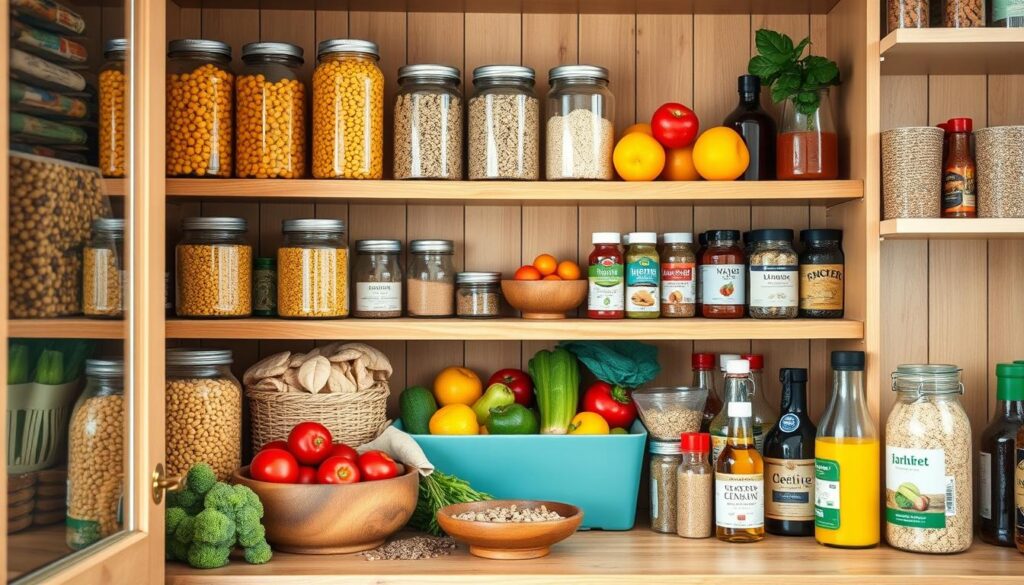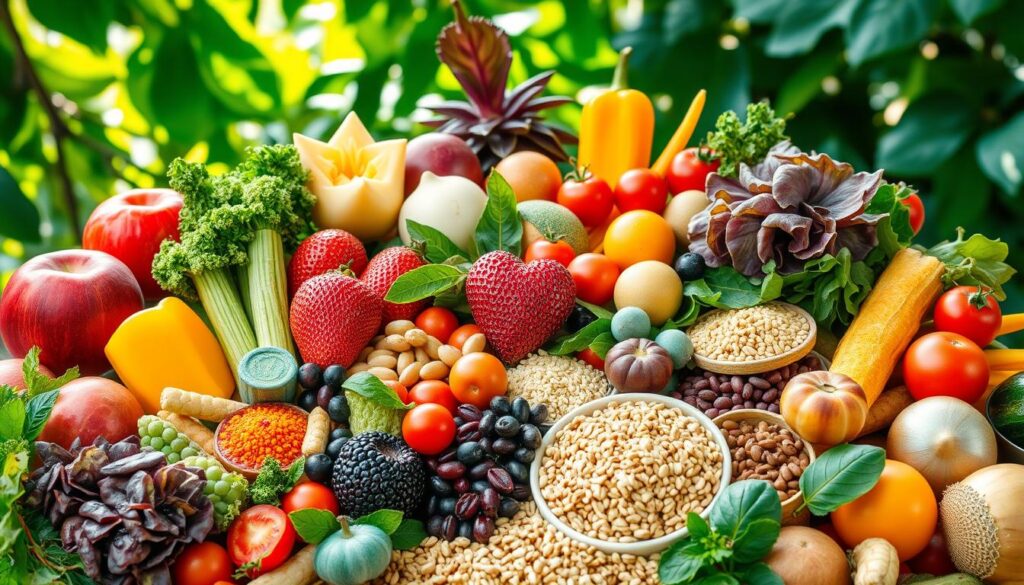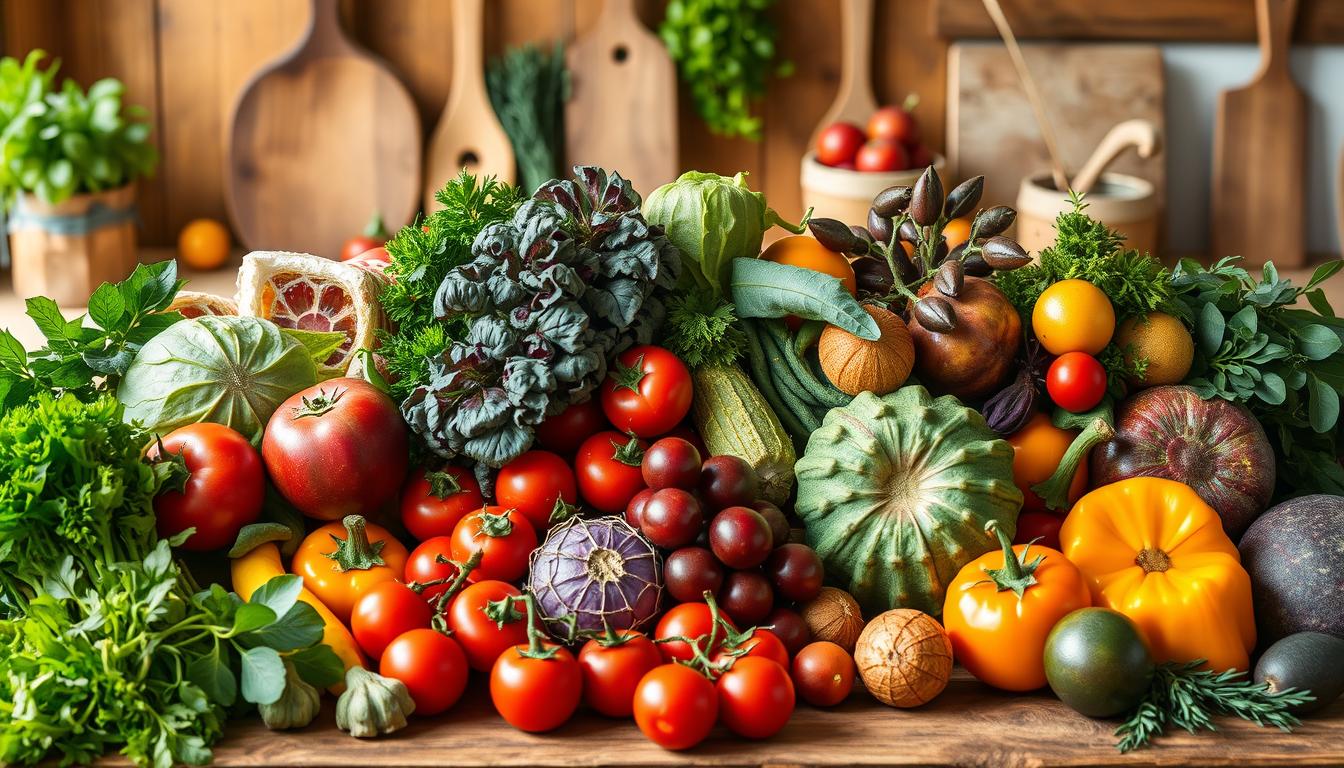Have you ever thought about how changing your diet could improve your health and the planet? With restaurants closing and social events canceled, cooking at home is becoming more popular. This is a great chance to join the plant-based eating movement.
In this article, we dive into the plant-based diet benefits for health, the environment, and ethics. Learn how it can lower disease risk, help with weight, and give your body key nutrients. We also share easy plant-based recipes to make starting easy.
Let’s explore how plant-based eating: benefits and easy recipes to get started can lead to a better, greener life.
Key Takeaways
- Home-cooked meals offer a chance to explore plant-based eating amid restaurant closures.
- Whole, minimally-processed plant foods can reduce the risk of chronic diseases.
- Plant-based diets are cost-effective and beneficial for mental well-being.
- Meal prepping with plant-based ingredients can save time with recipes taking less than 30 minutes.
- Organic, locally sourced plant-based foods support environmental sustainability.
Understanding the Plant-Based Eating Revolution
The plant-based eating revolution is sweeping the world. Over half of US consumers are interested in it. It’s good for health and the planet. Let’s explore why it’s happening and its historical significance.
Why Plant-Based Is Gaining Traction
Plant-based diets are becoming popular for many reasons. Sales of plant-based foods are soaring. This is due to several factors:
- Health Concerns: Plant-centric diets are linked to fewer chronic diseases.
- Environmental Impact: More people are choosing plant-based to help the environment.
- Fiber Intake: Plant-based diets are rich in fiber, which is lacking in many modern diets.
Many are looking for a balanced diet without supplements. Plant-based diets offer this without the need for extra nutrients.
Historical Context and Modern Trends
Plant-based diets have a long history. Societies that eat more plants have better health. Today, more people are interested in these diets.
- Ethical Motivations: Animal welfare is a big reason for choosing plant-based diets.
- Environmental Awareness: The diet’s impact on climate change is a major factor.
- Cultural Shift: More people are adopting plant-based diets, showing a cultural shift toward mindful eating.
With more recipe sites and blogs, it’s easier to try plant-based diets. This change reflects historical trends and today’s concerns about health, ethics, and the environment.
Health Benefits of a Plant-Based Diet
In recent years, more people are discovering the health benefits of a plant-based diet. This diet helps manage chronic diseases and boosts overall well-being. It’s based on eating more plants and less animal products.
Reduction in Chronic Diseases
Switching to a plant-based diet can lower the risk of chronic diseases. The China Study showed that plant-rich diets lead to longer, healthier lives. A 2017 study also found that a plant-based diet can lower blood pressure.
One author saw a 15.35% drop in total cholesterol and a 25% decrease in LDL (“bad”) cholesterol. Their A1C level fell to 5.5, eliminating prediabetes. This shows how effective plant-based nutrition is in managing blood sugar.
These results aren’t just for individuals. Experts recommend plant-based diets for their health benefits. They can lower BMI, blood pressure, and cholesterol, reducing the need for medication. A 2014 Yale analysis linked a plant-based diet to better health and disease prevention.
Weight Management and Nutrition
A plant-based diet is also great for weight management and nutrition. One person lost 30 pounds on a plant-based, oil-free diet. This diet helps with healthy weight loss and maintenance because it’s full of nutrients but low in calories.
Plant-based diets are high in fiber from vegetables, fruits, whole grains, and legumes. Fiber keeps you full, reducing unhealthy snack cravings. The U.S. has seen an 11 percent increase in plant-based food sales, showing growing interest in these benefits.
| Before | After | Change (%) | |
|---|---|---|---|
| Cholesterol (mg/dL) | 202 | 171 | -15.35 |
| LDL (mg/dL) | 124 | 93 | -25 |
| A1C Level | Pre-diabetic | 5.5 | – |
| Weight (lbs) | – | -30 | – |
By choosing plant-based nutrition, people can manage chronic diseases and maintain a healthy weight. It offers many health benefits. If you want to reduce health risks or manage your weight, a plant-based diet is a great choice.
Environmental and Ethical Advantages
The impact of our diet on the environment is huge, especially with climate change. Eating plant-based helps lower our carbon footprint. It cuts down on greenhouse gas emissions from meat production. This choice makes our lifestyle more sustainable and ethical.

Impact on Climate Change
Choosing plant-based foods helps fight climate change by reducing emissions. Meat production uses a lot of water, feed, and energy. It also releases methane. By eating plants, we can greatly reduce these emissions.
- Meat sales in the US fell by 5% from 2015 to 2019, showing a shift towards greener choices.
- The plant-based meat alternatives market globally is projected to surge from USD 1.6 billion in 2019 to USD 3.5 billion by 2026.
These numbers show the big move towards plant-based eating. It’s not just a trend; it’s a big step to fight climate change.
Animal Welfare and Ethical Eating
Plant-based eating also helps animals. It reduces the harm caused by industrial farming. It supports treating animals better. Here are some interesting facts:
In America, the number of vegans increased by 500%, from nearly four million in 2014 to 19.6 million in 2017.
In the UK, 21% of the population consider themselves flexitarian, and 1 in 8 declared being vegetarian or vegan.
These numbers show more people care about sustainable and ethical eating. By choosing plants, we help animals and the planet.
Getting Started with Plant-Based Eating
Starting a plant-based diet might seem hard, but it’s actually exciting. You’ll get healthier and help the planet. Let’s start with some easy tips, pantry essentials, and meal planning basics.
Tips for Beginners
If you’re new to plant-based eating, here are some tips to help:
- Start small: Add plant-based meals a few times a week and increase them slowly.
- Explore diverse recipes: Look for cookbooks, blogs, and YouTube channels for tasty plant-based dishes.
- Focus on whole foods: Choose whole grains, legumes, veggies, and fruits for better health.
- Join supportive communities: Online forums and local groups offer advice and motivation.
- Stay patient: It takes time to get used to new tastes and textures, so be patient.
Essential Pantry Staples
Having the right pantry items makes cooking easier and more fun:
| Category | Items |
|---|---|
| Grains | Quinoa, brown rice, whole wheat pasta, oats |
| Legumes | Black beans, lentils, chickpeas, kidney beans |
| Proteins | Tofu, tempeh, edamame, seitan |
| Nuts & Seeds | Chia seeds, flaxseeds, almonds, walnuts |
| Oils & Condiments | Olive oil, coconut oil, tamari, nutritional yeast |
| Spices | Turmeric, cumin, paprika, garlic powder |

Meal Planning and Preparation
Good meal prep for beginners needs planning and organization. Here are some steps to help:
- Plan a Weekly Menu: Set aside time each week to plan breakfast, lunch, and dinner for balanced nutrition.
- Batch Cook: Cook big batches of grains, beans, and veggies for easy portions all week.
- Store Wisely: Use airtight containers and label them to keep your meals fresh and easy to find.
- Variety is Key: Mix up your meals to avoid boredom and ensure you get all the nutrients.
Starting a plant-based diet is a step towards a healthier life and a greener planet. Every little bit helps! With the right pantry items and meal prep tips, you’re ready to enjoy a healthy and eco-friendly lifestyle.
The Revolution of Plant-Based Eating: Benefits and Easy Recipes to Get Started
Plant-based eating changes our health and the planet for the better. Many have seen big health improvements by starting a plant-based diet. For example, I lost 20 lbs in 90 days and my cholesterol dropped from over 200 to under 140. Many others have had similar results.
The growth of the plant-based industry is amazing. Veggie Grill has grown from one location to 33 across the US. The number of vegans in America has jumped from four million to 19.6 million in just three years. More people worldwide are eating less animal protein, with 40% trying to reduce it and 10% avoiding red meat.
- Veggie Grill’s expansion to 33 locations across the country.
- The number of Americans practicing plant-based eating increased by 500%.
- Globally, 40% of consumers are reducing animal protein intake.

Plant-based eating is good for our health and the planet. A 2020 Nielsen study found 40% of Americans want to eat more plant-based foods. This could cut greenhouse gas emissions from food production by 70%. Let’s make plant-based meals more common.
- Health benefits: weight loss, lower cholesterol, reduced risk of chronic diseases.
- Environmental advantages: reduced greenhouse gas emissions, less water usage.
- Ethical reasons: improved animal welfare, compassionate living.
| Category | Traditional | Plant-Based |
|---|---|---|
| Milk Sales (2013-2018) | Less than $16 billion | $21 billion |
| Greenhouse Gas Reduction | – | 70% |
| Burgers Sales (2019) | – | $283 million |
Starting a plant-based diet is easier than you think, thanks to many easy recipes. Join the revolution and enjoy the health and environmental benefits. Plus, you’ll love the tasty, simple recipes that will make you feel great!
Easy Plant-Based Recipes for Every Meal
Switching to a plant-based diet is exciting and rewarding. You’ll find tasty breakfast, lunch, and dinner options that are good for you. These recipes are easy to make and delicious!
Breakfast Ideas
Starting your day with healthy choices is key. Our vegan breakfast ideas include oatmeal and smoothies full of nutrients. Try these:
- *Overnight oats with chia seeds and fresh berries*
- *Smoothie bowls with tropical fruits and granola*
- *Tofu scramble with spinach and mushrooms*
Lunch Inspirations
Healthy lunches should be tasty and filling. Use beans, lentils, and veggies to make your midday meal nutritious. Here are some ideas:
“A well-balanced plant-based lunch keeps you focused and energized throughout the afternoon.”
- *Quinoa salad with chickpeas, cucumber, and lemon-tahini dressing*
- *Loaded veggie wraps with hummus and avocado*
- *Hearty lentil soup with carrots and celery*
Budget-friendly nutritious recipes help you save money while eating well.
Dinner Delights
Dinners should be comforting and tasty. Plant-based dinners offer a variety of flavors and textures. Here are some easy and satisfying dinner recipes:
- *Cauliflower and chickpea curry with garam masala and turmeric*
- *Black bean enchiladas with smoked paprika and cumin*
- *Vegan lasagna with zucchini, spinach, and cashew cream*
Our 15 delicious plant-based recipes for beginners are easy to follow. They use ingredients like cauliflower, mushrooms, and eggplant. These recipes promise great flavors and healthy meals. Start your journey to better health and energy today.
Addressing Common Challenges and Concerns
Starting a plant-based diet can feel daunting. But, tackling these challenges can make the transition easier. A big worry is getting enough nutrients. Plant-based diets are full of fiber, vitamins, and minerals. Yet, some nutrients like vitamin B12, iron, and omega-3s need extra care.
Fortified foods or supplements can help fill these gaps. This ensures you get all the nutrients you need.
Dealing with social situations can also be tough. Being the only vegan at gatherings can be intimidating. But, there are ways to handle this.
Bring a tasty plant-based dish to share. Or suggest vegan-friendly restaurants for outings. This way, you meet your dietary needs and share the joy of plant-based food with others.
Finding plant-based options in the grocery store can be a challenge, especially for newbies. Start by stocking up on vegan staples like beans, lentils, whole grains, nuts, and seeds. This gives you a solid base for making healthy, varied meals.
Plus, the variety of plant-based meats and dairy alternatives in stores makes it easier to switch. You can find everything from vegan burgers to plant-based milks.
Some worry about the cost of vegan products. But, many plant-based foods like grains, beans, and veggies are affordable. For convenience, there are now many quick, healthy vegan meals available, like veggie-packed pot pies and mac and cheese alternatives. These options are easy on the wallet.
- Ensure nutrient sufficiency with fortified foods and supplements.
- Bring plant-based dishes to social events or suggest vegan-friendly venues.
- Stock up on affordable pantry staples like beans, grains, and nuts.
- Take advantage of convenient vegan meal options in grocery stores.
Adopting a plant-based lifestyle has its hurdles. But, with these practical tips, it can be a rewarding and sustainable choice. The aim is to make it easy and enjoyable for everyone. This way, we can all move towards a healthier, more sustainable future.
Success Stories: Transformations with Plant-Based Eating
Real-life success stories and scientific research show the power of a plant-based diet. Personal stories and studies offer evidence and inspiration for those thinking about a plant-based lifestyle.
Personal Testimonials
Plant-based diet success stories are truly inspiring. People share amazing health and well-being improvements after switching to plant-based eating.
- Dr. Michael Greger, known for “How Not to Die,” talks about the health benefits of plant-based diets. His insights, based on vegan diet research, help many live healthier.
- The “Plant-Based Journey” book, recommended by dietitians and doctors, is filled with personal stories. Readers find relatable tales of weight loss, more energy, and clearer minds.
- At the Healthy Taste of Sacramento event, many reported health improvements. They shared their plant-based diet journeys, creating a supportive community.
Scientific Research and Case Studies
Scientific support for plant-based diets is strong and growing. Doctors and health experts often suggest plant-based diets for better health. The U.S. Dietary Guidelines Advisory Committee has also endorsed plant-based eating.
| Source | Key Findings |
|---|---|
| Journal of the Academy of Nutrition and Dietetics (2015) | A meta-analysis showed that a vegetarian diet can lead to weight loss. |
| Dr. John McDougall | Studies suggest that cholesterol and triglyceride levels are just part of heart health. They promote plant-based diets for heart benefits. |
| Forks Over Knives | This book is a great resource for understanding plant-based diet health benefits, supported by lots of research. |
Both personal experiences and scientific research highlight the health benefits of a plant-based diet. These stories show that plant-based eating is more than a trend. It’s a sustainable lifestyle choice supported by solid research and real-life success.
Conclusion
The move towards plant-based eating is more than a trend. It’s a lifestyle choice that benefits health and the environment. Eating whole plant foods and avoiding animal products can lower the risk of heart disease, diabetes, and some cancers.
Plant-based diets have a big impact on the environment. They reduce greenhouse gas emissions, deforestation, and water pollution. With more vegan options available, it’s easier than ever to stick to this lifestyle.
Switching to veganism requires careful planning to get all the nutrients. You might need supplements for B12 and calcium. It’s smart to talk to a doctor to make sure you’re getting everything you need. For inspiration, check out art-inspired recipes to spice up your cooking.
Choosing a plant-based lifestyle is good for you and the planet. It’s about making thoughtful choices and enjoying new foods. We encourage you to start your journey towards a more sustainable diet.

